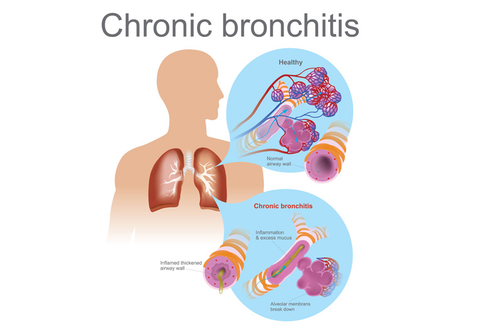
Millions of people are seriously addicted to smoking and get smoker’s cough easily nowadays. Although they realize it is harmful to their health, they can’t easily give up this awful habit. Smoking can lead to different health problems and complications, such as the smoker’s cough. In most cases, it becomes chronic and requires specific treatment. You inhale dangerous chemicals while smoking, and they are causing the problems in your lungs and throat.
How to Recognize Smoker's Cough
Smokers develop a persistent cough, which usually continues more than 2-3 weeks. Generally, the cough is dry at first; then, you may notice phlegm in addition to it. It is important to figure out how to distinguish the smoker’s cough from all the other types. The production of phlegm, the wheeze, and the crackling feeling in your chest are among the most typical symptoms of the smoker’s cough. That is why smokers have to visit their doctor more often for routine medical check-ups.
If you feel constant pain and notice an abnormal weight loss, this is another reason to see a doctor as soon as possible. Smoker’s cough should not be ignored, because it can lead to severe complications such as passing out after coughing and bleeding. It is difficult to quit smoking, but it is vital to observe your cough and make sure it does not worsen your health and stop you from enjoying life as a whole.
The Main Causes of Developing Smoker's Cough
The American Cancer Society claims tobacco contains a large number of chemicals that can cause cancer. Most of them seriously intervene with the cilia, which is responsible for the filtration of toxins from your airways. The cilia cannot function properly, and that leads to discomfort and pain. It is believed chemicals such as formaldehyde let more toxins enter smokers’ lungs. Then people can suffer from an inflammatory process and experience a severe cough because their body is struggling to remove the substances from these chemicals.
The Most Common Symptoms
As mentioned, the smoker’s cough is dry at first, but when phlegm occurs, it can be colorless, white yellow-green, or even blood-tinged. In most cases, smokers also experience crackling sounds while breathing and difficulty in breathing. Smoker’s cough can lead to chest pain, sore throat, and wheezing. This pain does not respond to medicines, but most people are so addicted to smoking that they don’t realize it makes them feel bad. The symptoms are most commonly felt in the morning and tend to get worse in time.
The Risk of Complications
Of course, when the cilia are damaged, lots of complications can occur. The occurrence of complications depends on the smoking frequency and the health condition of the person as a whole. The risk of respiratory infections is increased, and smokers might feel longlasting irritations in their throat.
Sadly, these irritations cannot be easily prevented. People should make an effort to quit smoking or at least minimize it. Let’s take a look at the most severe smoker’s cough complications:
Bronchitis
Bronchitis is probably one of the most common infections that occurs due to an inflammation of the lungs lining. One can experience difficulty in breathing and phlegms. When bronchitis continues for more than three months, it is considered chronic. Millions of people in the United States have a diagnosis of chronic bronchitis. And guess what, it is believed that smoking is the main cause.

Chronic obstructive pulmonary disease
For those not familiar with this term, it is used for chronic bronchitis and emphysema, conditions that include difficult breathing. When the alveoli are damaged, the body cannot receive enough oxygen, and it leads to chronic cough.
Incontinence
This complication is more likely to affect women. Heavy female smokers often feel the need to urinate more often, and their smoker’s cough results in urinary incontinence. Most of them consider it shameful, and probably the best thing they can do is search for psychological help.
Pneumonia
Smokers are more expected to get certain lung infections. One of the most serious is pneumonia, and again it includes difficult breathing, terrible cough, and fever. Unfortunately, most people suffering from pneumonia need to be hospitalized.
Lung cancer
Lung cancer is the most severe condition that results from smoking and endangers people’s lives. Researches show 90 % of lung cancer cases in the United States are connected to smoking. So, think about it carefully. Is it worth risking your life for smoking?
Treatment and Remedies
When the smoker’s cough becomes chronic, you can’t rely on medicines, so you have to come up with some natural remedies. Of course, it will be better if you quit smoking, but if you can’t, there are things you can do to help yourself.
Hydration
First of all, you should drink more water, around 6-8 glasses a day, and comfort your throat with gargles or lozenges. Try to reduce alcohol and coffee, including more physical activity to your routine, and more Vitamin C containing fruit juices to your menu. It is important to stay well-hydrated and prevent your throat from getting too dry.
Essential oils
Today, there are different necessary oil vape devices on the market that can help you reduce your cough. Eucalyptus oils are considered pretty effective. Once you try essential oils, you will realize how enjoyable and efficient they are, and you will certainly add them to your everyday routine.

Herbal supplements
However, you can try some herbal supplements to relieve your unpleasant symptoms. The supplements usually contain ginger, rosemary, oregano. They are perfect for home treatment. Some people prefer drinking green tea or chamomile tea, which helps with the complete relaxation of the body.
Honey
Presumably, the most common remedy for sore throat is the honey, and as it turns out, it is useful for smoker’s cough as well. If you want to relieve the discomfort in your throat, you should consume at least one spoon of honey daily, or add it to your tea.
Can A Smoker's Cough Go Away Immediately
If you think as soon as you quit smoking, your cough will disappear, that is not the actual case. Your cilia need more time to recover, and this might happen in 1 to 9 months. If you notice that you cough more after you quit smoking, this means the cilia is recovering and begins to function correctly. The phlegm from your lungs will be cleared, and you will stop experiencing the awful symptoms.
Medical Examinations
Supposing you notice your cough is continuing for more than three weeks, you will be better off if you go to see a doctor. Some of the symptoms, such as bloody cough, incontinence, pain in your ribs, or fainting after coughing, require medical treatment immediately.
If you feel like the symptoms are affecting your routine, you might consider testing for lung cancer. Don’t hesitate to seek medical help if you have yellow-green phlegm, headaches, trouble sleeping, or extreme weight loss. The faster it gets discovered, the adequate treatment you will receive.
